IELTS Exam Eligibility: Check Criteria, IELTS Exam Qualification, and IELTS Exam Age Limit
Highlights:
- Minimum Age: You must be 16 years old or above to register for IELTS.
- Educational Qualification: 10+2 and Open to individuals of all educational backgrounds.
- Documents Required: Passport for identification since other documents like Aadhar and driving license are not accepted.
- Nationality Restrictions: Anyone, regardless of nationality, can take the IELTS.
- Widely Accepted: Recognized by universities, institutions, and immigration authorities globally.
- IELTS for Disabled: IELTS provides extra facilities for disabled students on request
The International English Language Testing System (IELTS) is one of the most widely recognized English proficiency tests globally, taken by millions of students every year. The eligibility criteria for the IELTS test are determined jointly by the British Council and IDP. Top universities in countries like the UK and the USA have set high band scores (6.5+) as their IELTS exam qualification criteria.
Piyush Kumar, IDP Education's Regional Director for South Asia in 2022, gave the data in news reports that the “number of people taking the IELTS test in India had grown by 10-15% that year compared to a normal year before the COVID-19 pandemic (likely 2019).”
- No strict IELTS test eligibility criteria are set by the IELTS partners (British Council, IDP, and Cambridge).
- The minimum IELTS exam age is 16 years.
- No upper age limit is required for IELTS exam eligibility.
- A valid passport is required to take the IELTS test.
Also Check:
- Step-wise guide for IELTS Slot Booking and registration
- Check the available dates for the IELTS Test 2025–2026
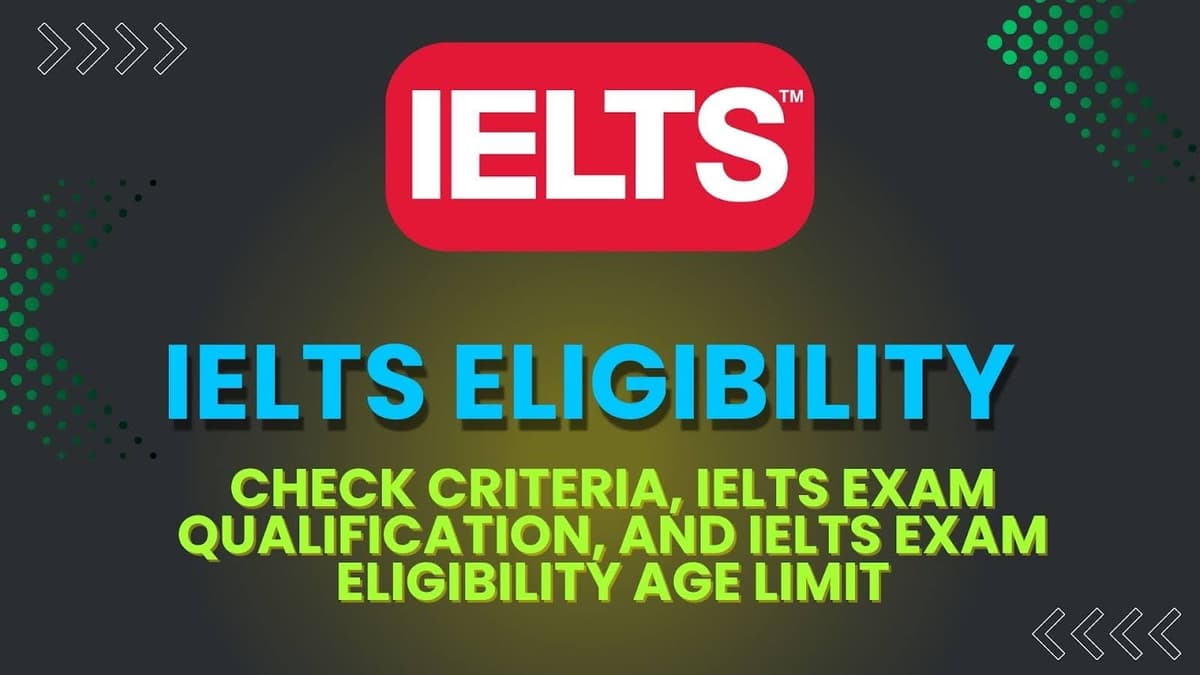
What is IELTS Eligibility?
The basic requirements set by the conducting bodies to take the IELTS test are called IELTS eligibility criteria. The IELTS determines the English proficiency of students taking the test. Unlike other competitive examinations, there are no strict eligibility criteria for the IELTS test. This makes the IELTS registration open to everyone across the globe.
Check:
Why Check IELTS Exam Eligibility Criteria?
Verifying the eligibility criteria for the IELTS exam before booking your IELTS exam slot is a smart move to plan better and avoid rejection in the application form. However, universities and immigration offices have set their own minimum score criteria; passing the IELTS test is the first step towards abroad journey.
FAQs
Ques: Do I need a minimum percentage in school/college to appear for IELTS?
Ans: For IELTS registration, there is no minimum educational percentage or qualification required.
Ques: Is there any restriction on the number of attempts?
Ans: No, candidates can retake the IELTS test as many times as needed to achieve the desired band score.
Eligibility Criteria for IELTS Academic vs. General Training
The general IELTS test eligibility criteria are simple; the test is available to all individuals who require proof of English proficiency. There are no barriers based on profession, nationality, or prior qualifications.
- IELTS Academic: Suited for those applying to universities or professional bodies; assesses readiness for academic environments.
- IELTS General Training: Ideal for migration, work, or non-academic training; focuses on everyday English skills.
Note: Both formats have the same eligibility – no differences in age or qualification requirements.
IELTS Test Eligibility Score
The IELTS results are the basis of admission into universities abroad. The minimum IELTS score requirement varies from University to University. You can also check the class profile of previously attended students to understand the average IELTS score.
- For a better picture, you can also check class profiles of past students on a university's website.
- Usually, the IELTS band score for admitted students ranges between 6.5 and 7.5 (out of 9) for top universities.
- Higher IELTS scores add extra points in some immigration systems.
- However, the minimum IELTS score requirement for work or immigration is usually less than that for university entry.
IELTS Eligibility Score for Canada
IELTS Eligibility for Canada requires both academic and general scores. The IELTS score band for academic and immigration purposes will vary. The minimum band score for IELTS for Academic is 6.5 or above. The minimum band score can be 6.5, but each university sets its own eligibility criteria for IELTS.
| Universities | IELTS Score |
|---|---|
| University of Toronto | 6.5 (with a minimum of 6.0 on each band) |
| McGill University | 6.5 |
| University of British Columbia | 6.5 (with a minimum of 6.0 on each band) |
| University of Alberta | 6.5 (with a minimum of 5.0 on each band) |
| McMaster University | 6.5 (with a minimum of 5.0 on each band) |
| University of Calgary | 7.0 (with a minimum of 7.0 on each band) |
Also Check:
- IELTS Score for Canada: Check Score for Colleges, Study Visa, and PR
- IELTS score for Canada PR: Check Programs and Score Requirements
FAQs
Ques: Is a higher IELTS score worth it for Canada PR applications?
Ans: Yes, a higher IELTS score is important for Canada PR applications. It directly enhances your Comprehensive Ranking System (CRS) points in the first language category.
Ques: What is the minimum IELTS score required for Canada PR through Express Entry?
Ans: You need at least 6.0 in each skill for the Federal Skilled Worker or Canadian Experience Class. That is listening, reading, writing, and speaking. This equals CLB 7 in all areas. But higher scores help you get more points and better chances.
IELTS Eligibility for UK
IELTS Eligibility for the UK accepts scores for UK visas. The applicants are required to submit English language proof at the time of the visa interview. Other than IELTS Academic and IELTS General training, a new kind of test has been introduced called IELTS Life Skills.
In this test, candidates need to prove skills in speaking and listening at level A1 or B1 of the Common European Framework of Reference (CEFR). Minimum IELTS Eligibility for the UK is given below:
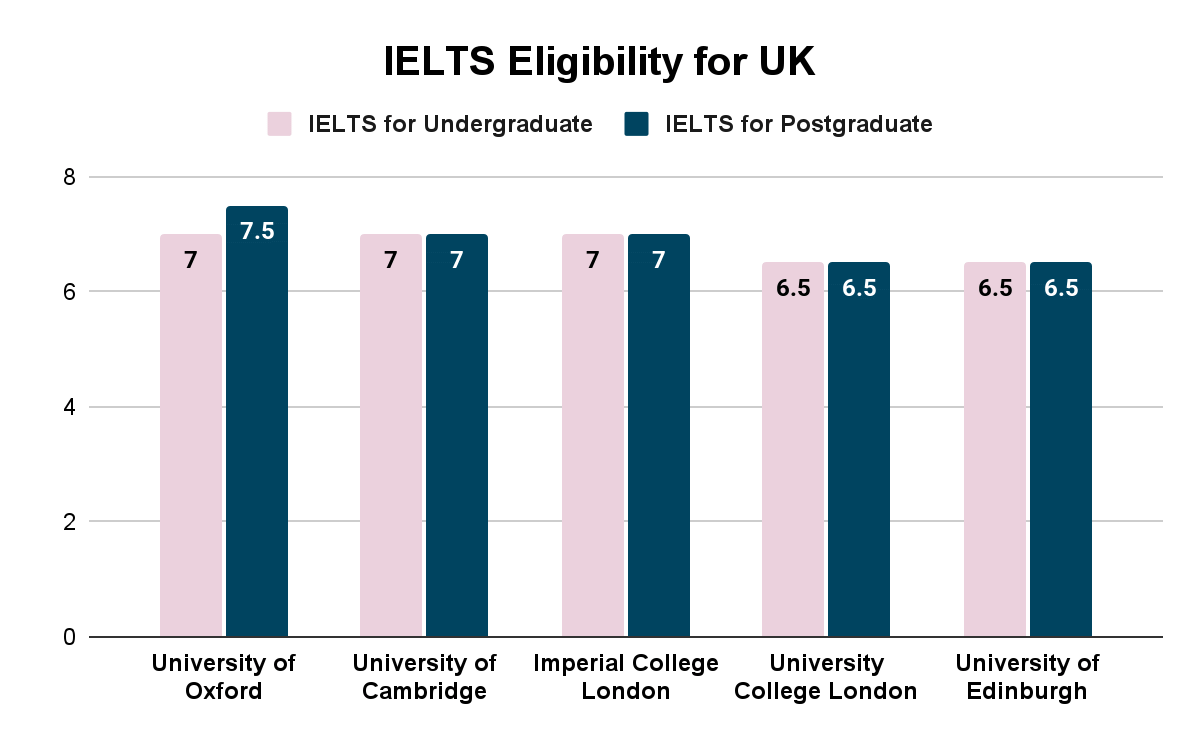
| Universities | IELTS for Undergraduate | IELTS for Postgraduate |
|---|---|---|
| University of Oxford | 7 | 7.5 |
| University of Cambridge | 7 | 7 |
| Imperial College London | 7 | 7 |
| University College London | 6.5 | 6.5 |
| University of Edinburgh | 6.5 | 6.5 |
Also Check:
- IELTS Admission Score Required for European Universities
- IELTS for UK: Check IELTS Cut Off for UK Universities
FAQs
Ques: Does the UK accept 5.5 IELTS?
Ans: Yes, the UK accepts IELTS with at least 5.5 in each skill. This is for visa types needing the CEFR B2 level. Examples include degree-level student visas and some work visas. You must use IELTS for UKVI.
Ques: Can I get a UK visa without IELTS?
Ans: Yes, you can get a UK visa without IELTS if you are:
- From a majority English-speaking country,
- Have an English proficiency degree
Ques: Is UKVI IELTS harder than regular IELTS?
Ans: No, IELTS for UKVI is not harder than regular IELTS. Both have the same content, format, scoring, and difficulty level, with only additional security measures for UKVI.
IELTS Eligibility for Australia
IELTS Eligibility for Australia requires a minimum of 6 band scores in each section. Australia follows its point-based system for PR and immigration.
- There are certain key profile factors, like education, age, and English language proficiency, to get points.
- If the candidate applies for PR or immigration in Australia, then he/she must score the most on the language proficiency factor.
IELTS Eligibility for Australia for immigration is as follows:
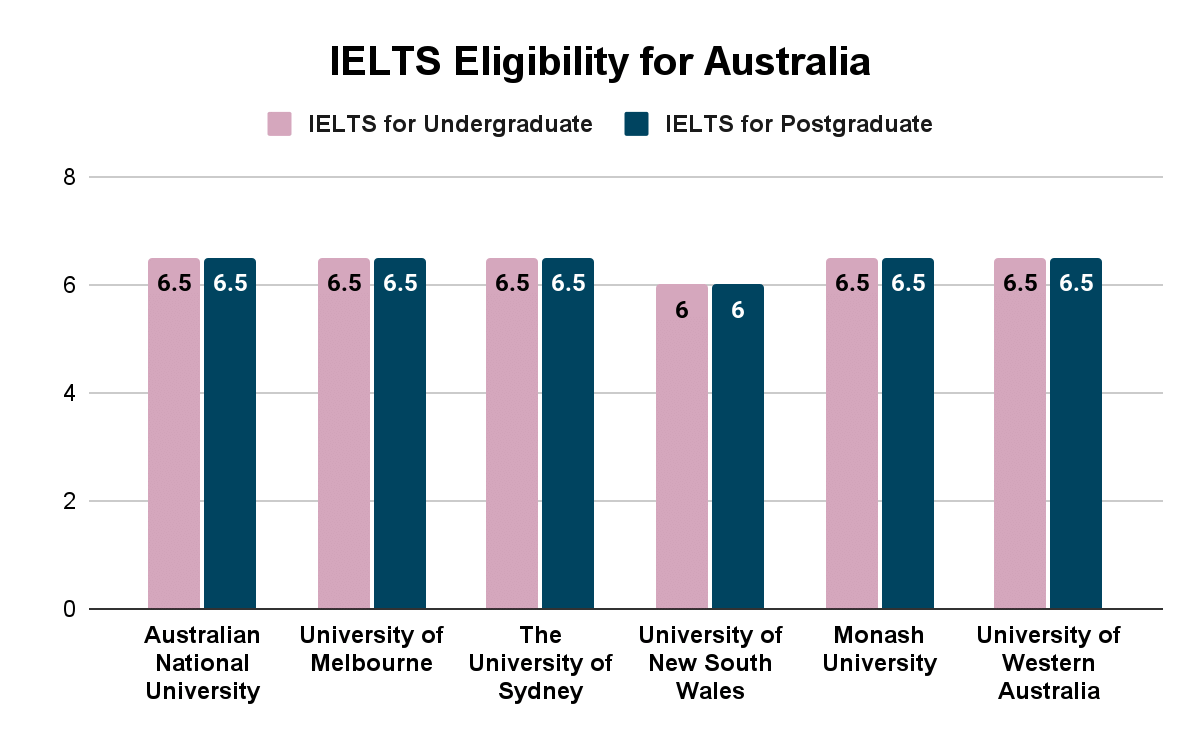
| Universities | IELTS for Undergraduate | IELTS for Postgraduate |
|---|---|---|
| Australian National University | 6.5 | 6.5 |
| University of Melbourne | 6.5 | 6.5 |
| The University of Sydney | 6.5 | 6.5 |
| University of New South Wales | 6 | 6 |
| Monash University | 6.5 | 6.5 |
| University of Western Australia | 6.5 | 6.5 |
Also Read:
- IELTS Score for Australia: Check Scores and Document Requirements
- IELTS Results: Check and Understand Your IELTS Scores Online
FAQs
Ques: What is the minimum IELTS score for Australian universities?
Ans: Candidates should have a minimum overall band score of 6 for Australian immigration and PR. Additionally, for ELICOS, the universities also accept an IELTS score of 5.0 or 5.5.
Ques: Can I use the IELTS One Skill Retake test for Australian visa applications?
Ans: Yes, most of the Australian Universities accept IELTS One Skill Retake results for visa purposes. This is valid for both IELTS Academic and General Training tests.
IELTS Eligibility for the USA
Every year, the USA employs lakhs of talented immigrants from overseas. There are various kinds of employment visas for the USA. Candidates have to get an overview of these working visas.
Below are some of the top universities in the USA that accept the IELTS score:
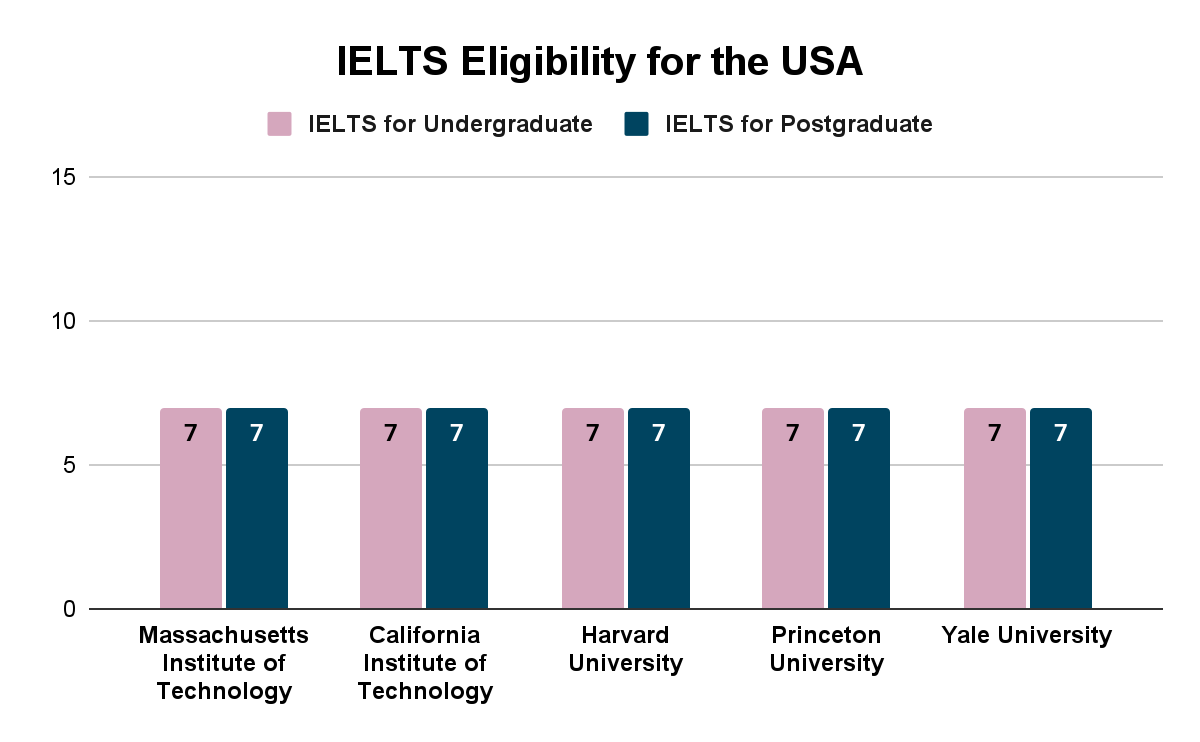
| Universities | IELTS for Undergraduate | IELTS for Postgraduate |
|---|---|---|
| Massachusetts Institute of Technology | 7.0 | 7.0 |
| California Institute of Technology | 7.0 | 7.0 |
| Harvard University | 7.0 | 7.0 |
| Princeton University | 7.0 | 7.0 |
| Yale University | 7.0 | 7.0 |
Also Check:
FAQs
Ques: What is the minimum IELTS score for US universities?
Ans: To study in the top universities of the USA, candidates need to score a minimum of 7.0 overall in IELTS.
Ques: Is IELTS needed for US work visas or immigration?
Ans: In the United States, the eligibility criteria for jobs or immigration depend on the organization. In some cases, passing the IELTS exam is a mandatory requirement, while in others, your academic qualifications and recommendation letters are sufficient. Generally, most work visas (such as the H-1B) or immigrant visas do not require IELTS.
Ques: Ques: What is A1, A2, B1, B2, C1, C2 in IELTS?
Ans: A1, A2, B1, B2, C1, and C2 are utilised as an international standard for describing language proficiency.
| CEFR Level | Description | Approximate IELTS Overall Band Score |
|---|---|---|
| A1 | Beginner | Below 4.0 (rarely mapped precisely) |
| A2 | Elementary | 3.5–4.0 |
| B1 | Intermediate | 4.5–5.5 |
| B2 | Discuss complex topics fluently, common for university entry | 6.0–6.5 |
| C1 | Advanced | 7.0–8.0 |
| C2 | Proficient/Near-native | 8.5–9.0 |
IELTS Eligibility for New Zealand
If the candidate wants to work or study in New Zealand, then the government requires a minimum eligibility criterion for English proficiency.
- An entrepreneur work visa requires an overall band value of 4, whereas the investor category requires an overall band score of 3 in IELTS.
- To study in the top universities of New Zealand, candidates must have a minimum score of 6.5.
Below is the list of top universities in New Zealand that accept the IELTS score:
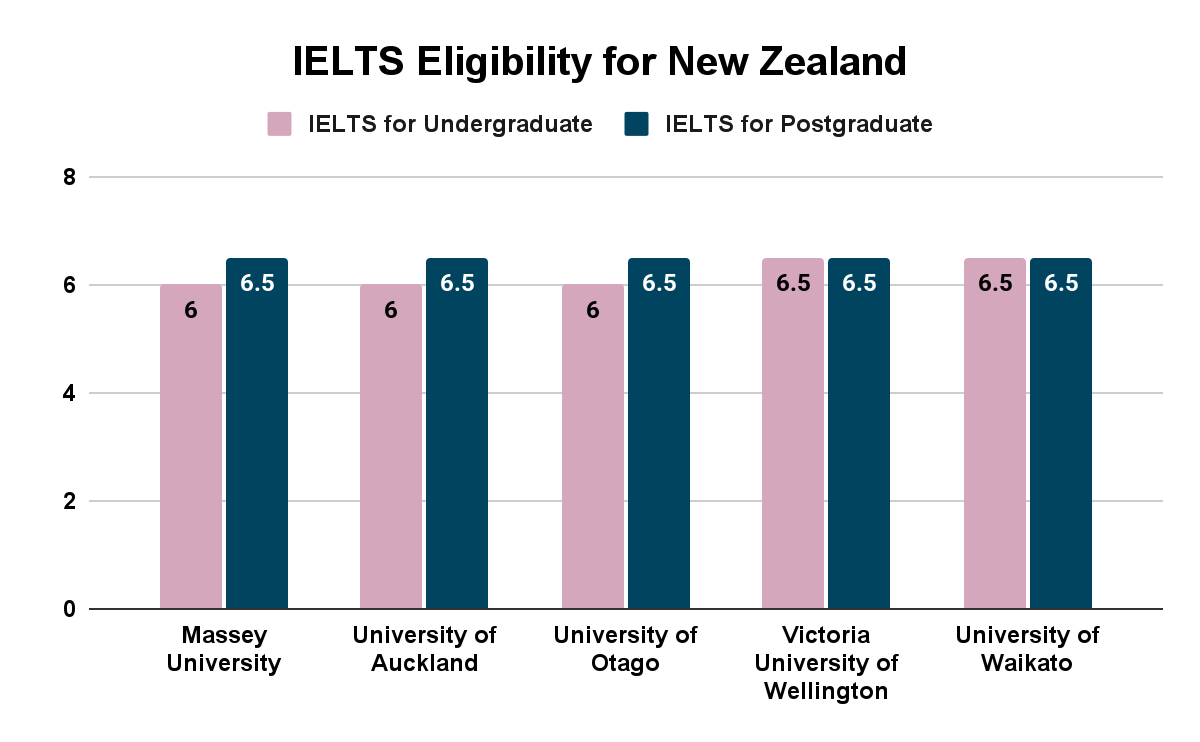
| Universities | IELTS for Undergraduate | IELTS for Postgraduate |
|---|---|---|
| Massey University | 6 | 6.5 |
| University of Auckland | 6 | 6.5 |
| University of Otago | 6 | 6.5 |
| Victoria University of Wellington | 6.5 | 6.5 |
| University of Waikato | 6.5 | 6.5 |
Also Check:
- IELTS for New Zealand student visa for Top Universities: Documents Required and IELTS Band Score
- IELTS Score for New Zealand: Check Scores for Universities and Visa Process
FAQs
Ques: What is the minimum IELTS score for New Zealand universities?
Ans: For skilled employment, applicants need to have a minimum score of 6.5 in the IELTS Academic or General Training test module. Similarly, if an employee is relocating Business Category should have a minimum score of 5 in IELTS General Training or Academic module.
Ques: How to get the section-wise IELTS score?
Ans: The section-wise score will be mentioned along with an overall band score (average of the four). IELTS results are usually announced:
- 3-5 days after computer-delivered tests or
- 13 days after paper-based tests.
Ques: Is there any option to request a remark or re-evaluation of my score?
Ans: Yes, you can apply for Enquiry on Results (EOR) within 6 weeks of results release. If scores change, you get a refund. It costs a fee (refundable if adjusted).
IELTS Exam Criteria for Retaking
There are no strict rules for IELTS retaking, which means you can appear for the IELTS test multiple times. You can book the IELTS exam slot anytime based on the availability at your IELTS test centers.
Also, for students who want to retake one skill, there are options available for them too, named as IELTS One Skill Retake. In this, you have to appear for just one section (Reading, Listening, Writing, or Speaking) in which you are unsatisfied with the IELTS score.
The IELTS exam criteria for retaking include:
- IELTS Retaking booking must be done within 60 days of the original IELTS test.
- For this, you will get the new Test Report form with the updated IELTS score.
- The IELTS retaking option is only available for the computer-delivered test mode.
FAQs
Ques: Is there any waiting period for retaking the full IELTS exam?
Ans: No. There is no mandatory waiting period for IELTS for retaking the skill test. You can book and retake the test as soon as you feel satisfied, and a test date is available at your chosen center.
Ques: Do universities, employers, or immigration authorities accept One Skill Retake results?
Ans: Acceptance is growing worldwide, including for many migration purposes. However, IELTS exam criteria for retaking vary depending on the Universities. It is always better to check directly with the organization (university, employer, or immigration body).
IELTS Eligibility for Disabled
Anyone can take the IELTS test for studies or migration, or work purposes abroad. There are no restrictions on appearing in IELTS for disabled candidates. Special arrangements are available for such candidates at the IELTS test centers. The exam centers provide
- Modified test materials (e.g., braille, large-print papers).
- Extra time.
- Use of a scribe, reader, or assistive technology.
- Separate room or other support.
For these special arrangements, the test centers must be informed prior so that candidates won't have to suffer on the IELTS test day.
FAQs
Ques: How many days in advance do disabled candidates need to inform the IELTS test centers about their special requirements?
Ans: Contact your test center at least 6 weeks in advance (earlier is better, as some arrangements take time to approve).
- Provide supporting medical evidence or documentation.
- No extra charge is to be paid for these arrangements.
- All requests are subject to approval, and the test will be assessed objectively regardless of accommodations.
Ques: Do accommodations affect my IELTS score or Test Report Form?
Ans: No. Your test is assessed in the same way as all other candidates. In very rare cases of approved exemptions (e.g., for severe impairments), a note may appear on your Test Report Form explaining the adjustment, but scores remain valid for most purposes.
FAQs
Ques: What are the basic eligibility criteria for the IELTS test?
Ans: Here is a summary of IELTS exam qualification requirements:
| Requirement | Details |
|---|---|
| Educational Qualification | None required; open to all educational backgrounds |
| Identification | Valid passport or approved ID (mandatory for registration and test day) |
| Test Format Choice | Academic (for higher education/professional registration) or General Training (for migration/work) |
| Special Arrangements | Available for candidates with disabilities (notify in advance) |
Ques: Is there a difference in eligibility for Academic and General Training IELTS?
Ans: No, the eligibility criteria are eligibility for Academic and General Training IELTS are the same. The choice depends on your purpose (study vs. work/migration).
Ques: Is there a maximum age limit for IELTS?
Ans: No, there is no upper age limit eligibility criteria for the IELTS exam. Candidates of any age above the recommended 16 can appear for the test.
Ques: How to check your IELTS eligibility?
Ans: To verify whether you are eligible for the IELTS exam or not, visit the official websites of the British Council, IDP, or Cambridge. You can also contact your local IELTS test center near you.
- You just have to provide your details during registration.
- For the rest, the system will guide you.
- Always ensure your ID is valid.
- Choose the correct test format based on your goals.
Ques: What documents are needed for IELTS registration?
Ans: A valid passport is the mandatory document for IELTS registration as well as on the test day. Other IDs are not accepted at the IELTS test centers.
Comments
The exam conducting bodies like IDP or British Council has not decided on any age criteria for IELTS. If you are a candidate above 16 years of age and have a valid (unexpired) passport you can appear for IELTS irrespective of your nationality, gender, race, religion, or age. Also, there is no upper age limit for appearing for the exam.
The IELTS band score requirement for different countries varies. IELTS eligibility criteria are different for universities across the world. Before enrolling, you must know the class profile of the previous batch to understand the minimum IELTS score required for admissions. The average overall band score varies from 6 to 7.5 out of a scale of 9 in most countries.